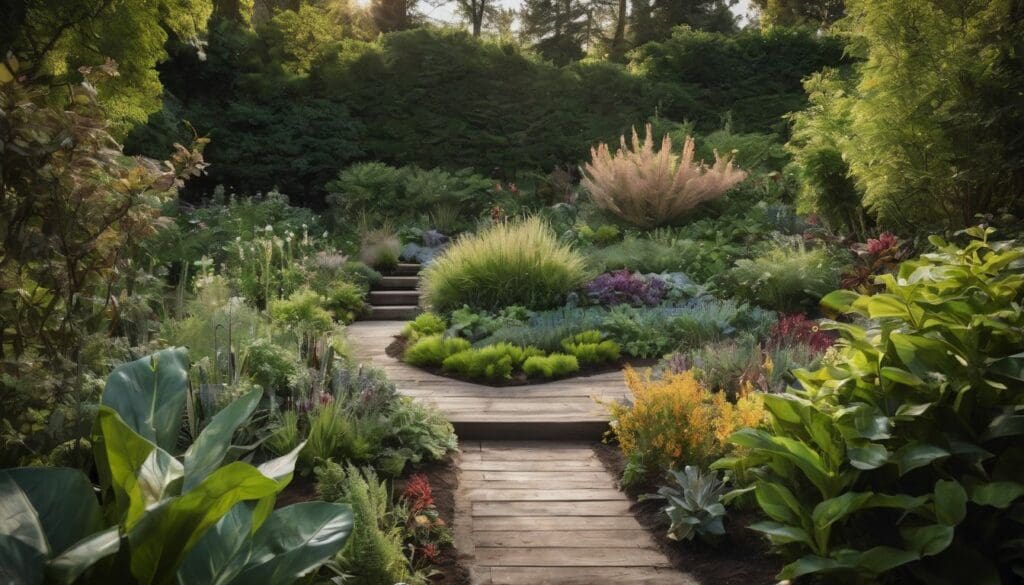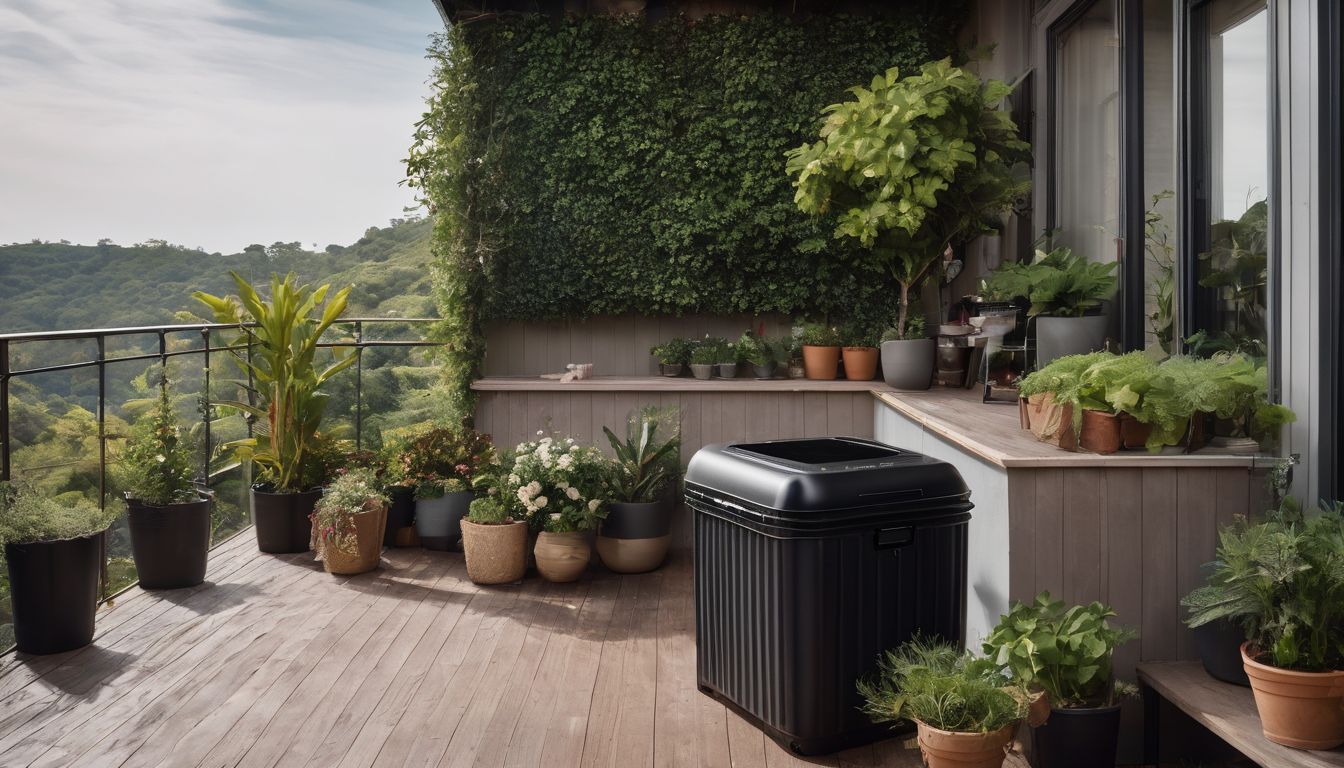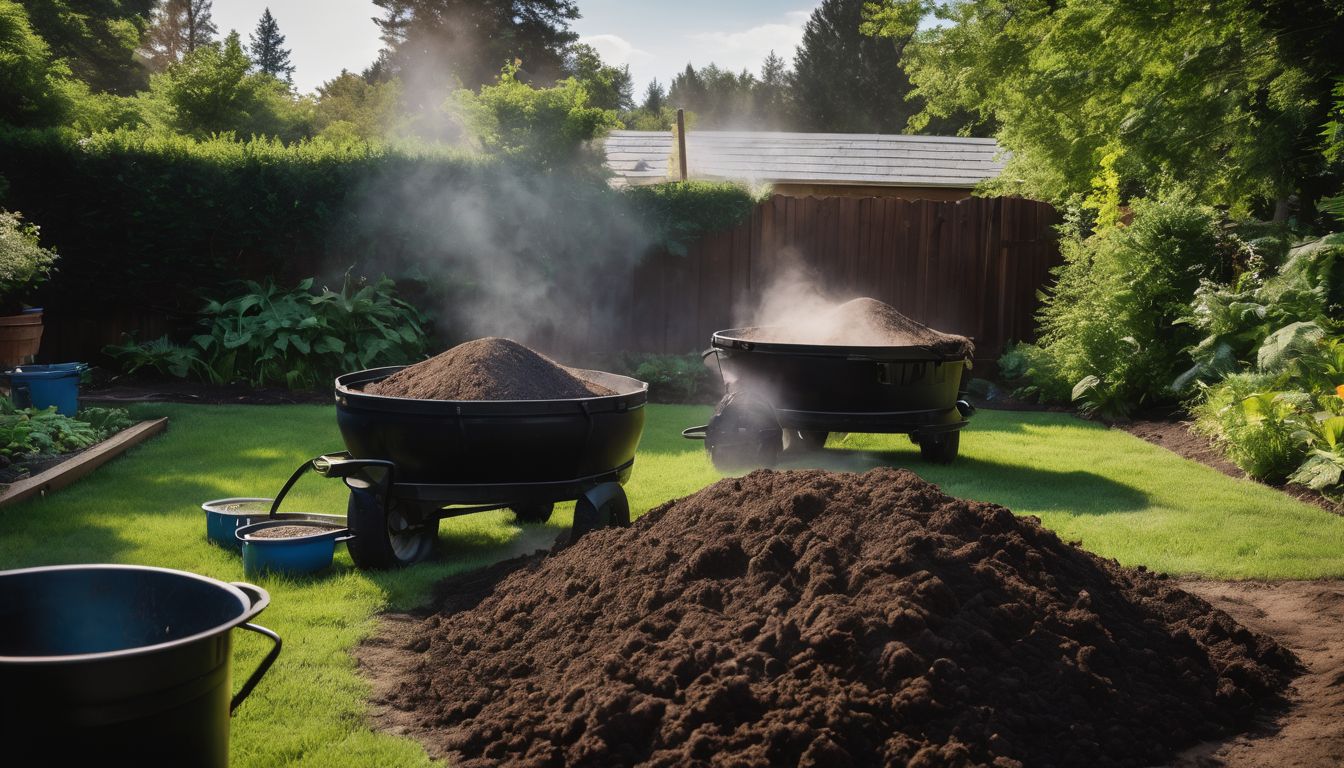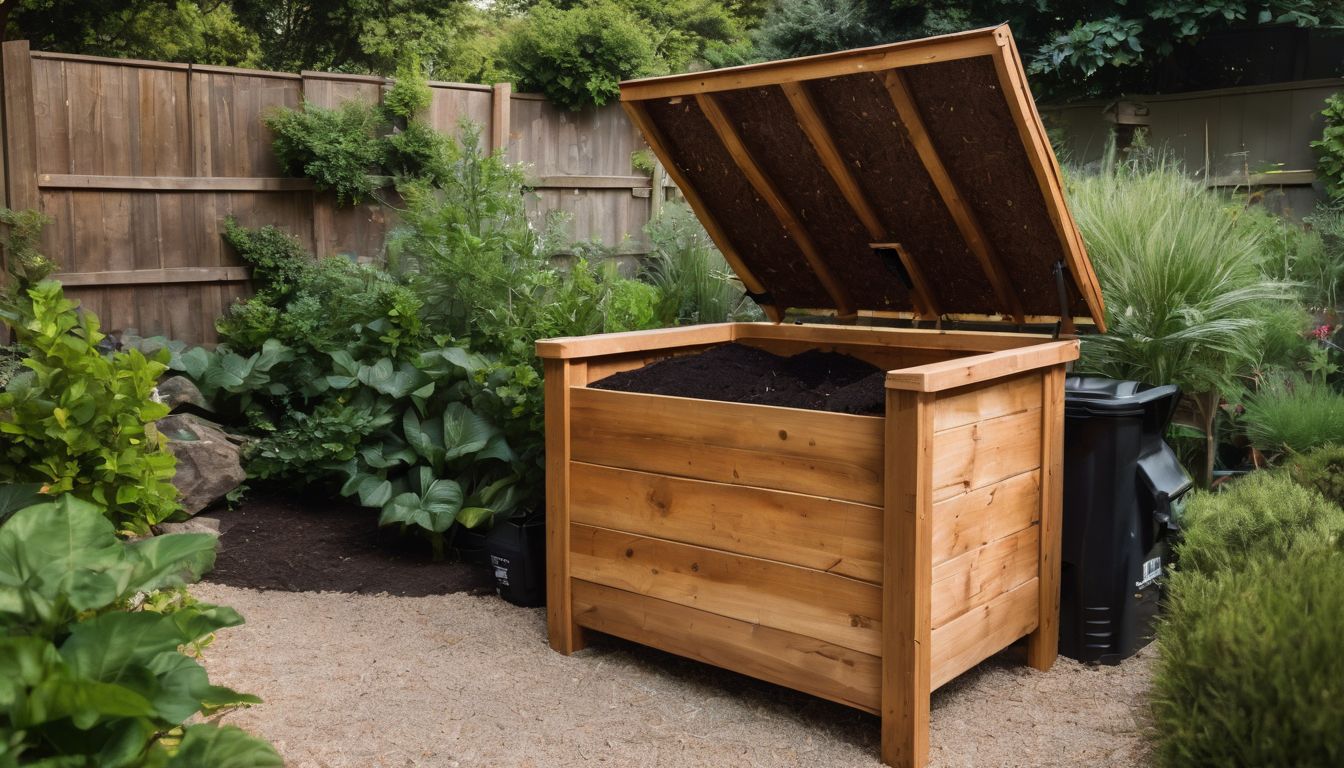Are you a garden enthusiast looking to boost your composting game? Composting is a clever way to turn kitchen scraps and yard waste into ‘black gold‘. This guide reveals cutting-edge methods to supercharge your soil and nurture your plants.
Dive in for greener gardens!
Key Takeaways
- Layering green and brown materials accelerates decomposition, creating a balanced environment for microbes to thrive.
- Adding supplemental materials like straw, coffee grounds, or comfrey leaves enhances the nutrient content of compost.
- Utilising local resources such as community compost sites or free organic waste can reduce costs and support sustainable practices.
- Implementing no – till gardening alongside composting preserves soil structure and promotes healthier plant growth.
- Using various composting methods like bokashi, worm bins, or black soldier flies caters to different gardening setups and environmental conditions.
What is Composting?
Composting is the natural decomposition of organic materials, turning waste into nutrient-rich soil. It’s a vital process for avid gardeners looking to improve their soil and plant growth.
Natural decomposition of organic material
Natural decomposition of organic material is a fundamental aspect of composting. This process involves breaking down plant remains, food scraps, and other biodegradable items into simpler substances.
Microorganisms like bacteria and fungi play a crucial role, working tirelessly to convert waste into nutrient-rich soil. Gardening with compost improves the structure of the earth beneath our feet, leading to healthier plants.
In this dynamic cycle, leaves that fall in autumn and leftover vegetable peels from your kitchen join forces in the composter. They gradually transform into humus, a dark and crumbly addition to any garden bed creation.
This rich substance is full of life; it teems with microbes essential for organic gardening techniques. By harnessing natural decay processes within your own backyard sanctuary or community plot, you support biodiversity while reducing landfill waste – attaining sustainable gardening excellence.
Process of turning waste into nutrient-rich soil
Turning waste into nutrient-rich soil involves the natural decomposition of organic materials, resulting in a valuable resource for avid gardeners. This process effectively recycles household and yard waste, converting it into compost that enriches the soil with essential nutrients and beneficial microorganisms.
By layering fresh materials, incorporating food waste, and utilising supplemental materials, advanced composting techniques can enhance the nutrient content of the soil, promoting healthier plant growth without tilling or disturbing the soil structure excessively.
Composting not only reduces organic waste sent to landfills but also fosters sustainable gardening practices by nurturing healthier soils and promoting environmental conservation.
Benefits of Composting for Avid Gardeners
Composting improves soil productivity, aids in weed control, and increases plant growth. With the right composting methods, avid gardeners can enjoy healthier and more productive gardens.
Improves soil productivity
Enhancing soil productivity is a key benefit of composting. Organic matter added to the soil through composting increases its water retention capacity, creating a more hospitable environment for plant roots.
Nutrient-rich compost also promotes beneficial microbial activity in the soil, which further contributes to improved soil structure and fertility. Additionally, by adding essential nutrients back into the earth, advanced composting techniques play a vital role in maintaining sustainable and healthy gardening practices.
Utilising advanced composting methods can significantly enhance gardeners’ ability to cultivate flourishing plants while supporting environmental conservation efforts. Soil enrichment through composting helps sustain the delicate balance of nature and reduces reliance on chemical fertilisers that may have adverse effects on ecosystems.
Helps with weed control
Composting contributes to weed control by enriching the soil with essential nutrients that help plants thrive, creating an environment where weeds struggle to compete. The nutrient-rich soil created through composting encourages strong, healthy plant growth, which ultimately outcompetes and suppresses weed development.
By incorporating advanced composting techniques such as sheet composting or layering in fresh materials, avid gardeners can further enhance their ability to control weeds naturally while promoting sustainable gardening practices.
Implementing advanced composting methods not only enriches the soil but also reduces reliance on chemical herbicides for weed management. This approach aligns with environmentally conscious efforts towards organic waste management and green gardening, supporting nutrient recycling while minimising environmental impact.
Increases plant growth
Enhancing plant growth is a key benefit of composting. Nutrient-rich soil resulting from composting provides essential elements for healthy plant development. Supplemental materials such as food waste and household organic matter can contribute to this nutrient richness, improving the overall productivity of the garden or planting area.
Furthermore, incorporating advanced composting techniques like microbe-boosted decomposition ensures that plants receive an optimal balance of nutrients, fostering robust and thriving growth.
These methods are particularly beneficial for avid gardeners seeking to maximise their gardening efforts whilst contributing positively to the environment.
Choosing the Right Composting Method for Your Garden
When it comes to composting, there are several methods to choose from, including community composting, bokashi, worm bins, green cones, and black soldier flies. Each method has its own benefits and considerations for the avid gardener.
Community composting
Community composting is a collaborative effort among neighbours, local businesses, or community organisations to manage organic waste. This method involves establishing a central compost site where members can contribute their kitchen scraps and yard waste.
By working together, participants share resources and produce high-quality compost for gardening projects. Community composting promotes environmental stewardship while building stronger connections within the community.
When participating in community composting, individuals benefit from sharing knowledge and experiences with others who are passionate about sustainability. This communal approach not only reduces individual waste but also strengthens the sense of shared responsibility for the environment.
Bokashi
Bokashi composting is a Japanese method that relies on fermentation to break down organic waste. It involves the use of a special mix of microorganisms to rapidly decompose kitchen scraps, including meat and dairy.
This process is anaerobic, meaning it occurs without the need for oxygen and can take place in a sealed container, making it an ideal option for urban or indoor composting. Bokashi also produces a nutrient-rich liquid fertiliser that can be diluted and used to nourish plants.
Its ability to process all types of food waste makes it a popular choice for avid gardeners looking to minimise their environmental impact while enriching their soil with beneficial microbes.
Worm bins
Vermicomposting, also known as worm composting, is a popular method for avid gardeners. Worm bins are an efficient way to turn kitchen scraps and other organic materials into nutrient-rich vermicompost.
Red worms thrive in these bins and rapidly break down the waste into valuable soil conditioner. The process is environmentally friendly and suitable for small spaces, making it an ideal solution for households with limited outdoor areas.
With a simple setup, utilising household waste becomes effortless. Avid gardeners can benefit from this advanced composting technique by incorporating vermicompost into their gardening practices, improving soil quality and promoting sustainable living through mindful waste management.
Green cones
Transitioning from worm bins to green cones, another advanced composting method is the use of green cones. Green cones are a great way to dispose of household food waste while providing natural nutrients for your garden.
They work by allowing food waste to break down naturally in the ground, combining with soil and enriching it over time.
Green cones offer an efficient and environmentally friendly solution for avid gardeners looking to reduce their carbon footprint. By utilising green cones in your composting strategy, you can effectively manage household waste while contributing to the health and vitality of your garden soil.
Black soldier flies
Black soldier flies play a crucial role in advanced composting techniques. These flies accelerate the decomposition process by consuming organic waste. They help break down materials quicker than traditional composting methods, resulting in nutrient-rich soil for gardening.
Black soldier flies are an environmentally friendly solution for managing household waste and reducing the amount of material sent to landfills. By incorporating black soldier flies into your composting system, you can enhance soil fertility and contribute to sustainable gardening practices.
These efficient insects turn food scraps and other organic matter into valuable resources, benefitting both avid gardeners and the environment. Integrating black soldier flies into your composting routine is a practical way to take your gardening efforts to the next level while minimising your ecological footprint through effective waste management.
Advanced Composting Techniques
Layering in fresh materials and utilising supplemental materials can help speed up the composting process. Incorporating food waste and practicing no-till gardening are also advanced techniques that avid gardeners can implement for optimal soil improvement.
Layering in fresh materials
To boost your composting game, try layering in fresh materials. This technique involves alternating between green and brown materials to promote decomposition. This balance is vital for microbial activity, which breaks down the organic matter effectively.
- Start with a layer of brown materials such as dried leaves or straw.
- Add a layer of green materials like vegetable and fruit scraps or grass clippings.
- Sprinkle a thin layer of garden soil or finished compost to introduce beneficial microorganisms.
- Repeat the layers, ensuring proper aeration by incorporating coarse materials like twigs or shredded paper.
Utilising supplemental materials
- Introduce additional carbon sources such as straw, shredded paper, or cardboard to aid in the decomposition process and improve the compost’s structure.
- Incorporate high-nitrogen materials like grass clippings, coffee grounds, or fruit and vegetable scraps to balance the carbon-to-nitrogen ratio for optimal microbial activity.
- Utilise natural accelerants like comfrey leaves or nettles to introduce beneficial microbes and speed up decomposition.
- Add biochar, a type of charcoal, to enhance soil fertility and moisture retention within the compost.
- Mix in rock dust or crushed eggshells to provide essential minerals for plant growth when using the finished compost in the garden beds.
Incorporating food waste
When incorporating food waste into your compost, ensure to balance the carbon and nitrogen levels. This includes mixing in additional browns such as leaves or shredded paper to offset the high nitrogen content of food scraps.
Chop food waste into smaller pieces before adding it to the compost bin, speeding up the decomposition process and preventing clumping. Introduce a variety of kitchen scraps, including fruit and vegetable peels, coffee grounds, tea bags, and crushed eggshells for a diverse array of nutrients that will benefit your garden soil.
By properly integrating food waste into your composting routine, you can create nutrient-rich soil amendments which are essential for optimising plant growth. Moving forward with advanced composting techniques like this ensures maximum benefits for both your garden and the environment while minimising household waste.
No-till gardening
No-dig gardening is a sustainable practice that minimises soil disturbance by eliminating the need for tilling, ploughing, or turning over the soil. This approach helps to preserve soil structure and texture, reduce erosion, and promote healthy microbial activity in the soil.
By layering organic materials directly on top of the ground instead of digging them in, no-dig gardening enhances water retention, promotes beneficial earthworm activity, and reduces carbon dioxide emissions from traditional tillage methods.
Implementing no-dig gardening minimises disruption to natural processes such as microbial decomposition and nutrient cycling within the soil. Additionally, this method can improve overall soil health and fertility over time while requiring less labour and energy input compared to conventional gardening practices.
Tips and Tricks for Successful Composting
Lift the composter while forking in compost to increase aeration. Start small and build up your composting efforts gradually, utilising free or inexpensive sources of compostables.
Lift composter while forking in compost
When forking in compost, carefully lift the composter to ensure that the material at the bottom is thoroughly mixed with the rest. Mixing the contents aerates and distributes moisture evenly, promoting efficient decomposition.
This technique helps avoid anaerobic pockets and accelerates the breakdown of organic matter, producing nutrient-rich compost for your garden.
Incorporating this lifting motion while forking in compost ensures that beneficial microorganisms are uniformly distributed, resulting in a more balanced and fertile end product. By regularly employing this method, you can effectively maintain a healthy compost pile that supports robust plant growth and soil health.
Don’t bag garden waste
When it comes to advanced composting techniques, avid gardeners should avoid bagging garden waste. Instead, leave grass clippings, leaves, small branches, and other organic yard waste on the ground where they can naturally decompose and provide essential nutrients to the soil.
This helps in maintaining a healthy ecosystem within your garden and reduces the need for landfill space or additional resources for waste disposal.
Moreover, by not bagging garden waste, you also allow beneficial organisms such as earthworms and microbes to break down the materials effectively. This natural decomposition process enriches the soil with organic matter that supports plant growth while reducing reliance on synthetic fertilisers.
Start small and build up
Begin with a small compost pile, then gradually add more organic materials as you gain confidence. This method allows for better control and understanding of the composting process.
Gradually increasing the size helps to manage odour, pests, and other potential issues while also ensuring that your compost is properly maintained.
By starting small and building up slowly, you can learn from any mistakes without committing too many resources at once. As you become more comfortable and knowledgeable, you can expand your composting efforts to accommodate larger quantities of organic waste.
Utilise free or inexpensive sources of compostables
Take advantage of free or low-cost sources of compostables by collecting leaves, grass clippings, and garden waste from your own garden. Additionally, consider sourcing coffee grounds, fruit and vegetable scraps from local cafes or farmers’ markets.
Utilise shredded paper and cardboard packaging as a carbon-rich addition to your compost pile. Seek out horse stables or farms for manure – an excellent source of nitrogen for a balanced compost mix.
Once you’ve gathered these materials, layer them in your compost bin to create the perfect blend for healthy decomposition. By utilising these readily available resources, you can support conservation efforts and contribute to sustainable gardening practices without breaking the bank.
Consider using a composting service
Consider utilising a composting service to make the most of your household waste. By using a professional service, you can ensure that your compost materials are managed effectively and in an environmentally friendly manner.
This will not only save you time and effort but also help reduce greenhouse gas emissions from decomposing organic waste.
Utilising a composting service can also provide additional peace of mind, knowing that your household waste is being processed responsibly. Moreover, it allows experienced gardeners to focus on other advanced composting techniques while leaving the management of household waste composting in reliable hands.
Conclusion
Enhance your composting game with advanced techniques like no-dig gardening, cold composting, and utilising supplementary materials. Incorporate food waste for a richer mix and layer fresh materials for optimal decomposition.
Elevate your expertise, reduce waste, and nurture your garden with these advanced composting tips. Take the lead in sustainable gardening practices while creating nutrient-rich soil for a thriving garden.
FAQs
1. What are some advanced composting techniques for gardeners?
Advanced composting practices include using no-till gardening methods, cold composting strategies, and adopting specific tips to enrich your garden’s soil with nutrients effectively.
2. How does no-till gardening benefit my compost?
No-till gardening means less disturbance to your soil, allowing worms and microbes to thrive which helps in breaking down the compost materials more efficiently into rich, fertile earth.
3. Can I do cold composting at home?
Yes, cold composting is a simple method where you pile up garden waste like leaves and grass clippings and let it break down over time; it’s an easy technique for experienced gardeners to manage their organic waste.
4. Why should an avid gardener use advanced composting skills?
Avid gardeners who master advanced composting skills can improve their soil health dramatically, producing lush gardens full of vibrant plants thanks to the nutrient-rich homemade compose they create.





